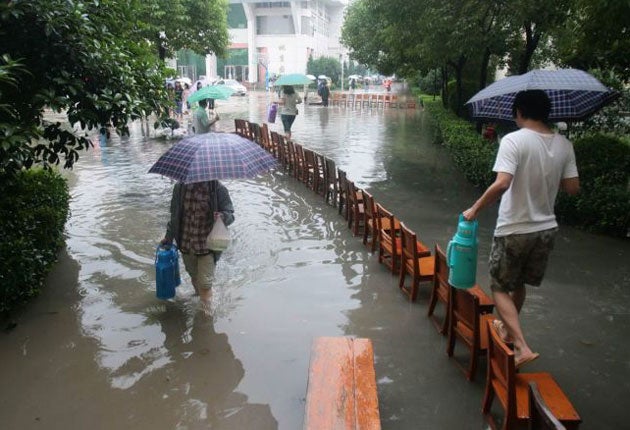UK to fare better than most as world warms up
High night temperatures are predicted for UK cities, and these were blamed for deaths in the heatwave of 2003

Britain will fare better than most other countries as the world heats up in the 21st century, but people living in London and other major UK cities will have to get used to uncomfortably hot summer nights, the latest assessment of global warming suggests.
A team of climate scientists in the United States have produced a detailed global study of the temperature increases expected in different regions over the coming century.
The analysis shows places such as China and the Arctic experiencing some of the greatest increases, while Britain remains relatively unscathed due mainly to the moderating influence of the North Atlantic. Even under the worst-case scenario, with a global failure to curb industrial emissions of carbon dioxide, Britain experiences an average temperature increase of between 2C and 4C by 2100, and North America has a catastrophic increase five times greater over the same period, the scientists say.
But the "urban heat-island" effect caused by buildings and roads trapping heat will mean that British cities will experience a much higher frequency of hot summer nights. High night-time temperatures, rather than day-time heat, was the major factor behind the deaths of thousands of elderly Europeans during the unusually hot summer of 2003: fatal heart and breathing problems usually strike at night.
The computer model used in the assessment was developed by the US National Centre for Atmospheric Research (NCAR) in Boulder, Colorado, and is among several that will form the basis of the next assessment of global climate change to be published by the Intergovernmental Panel on Climate Change (IPCC) in 2014. James Hurrell, chief scientist of NCAR's Community Earth System Model, says the model is more sophisticated than anything used in the previous four assessment reports of the IPCC. It addresses some of the concerns of critics who have questioned whether such computer models can accurately predict something as complex at the Earth's climate system.
The model incorporates parts of the climate system that were not included in previous models such as the melting ice-sheets and Arctic sea-ice. It also attempts to build in the effect of aerosol particles in the air which can influence how much heat radiation is trapped or reflected by the atmosphere, as well as having a crucial effect on the formation of clouds.
The model runs on a suite of supercomputers and is composed of 1.5 million lines of computer code, which is made freely available to anyone who wants to inspect it, he says. "It is our flagship model and what sets us apart is that we have made it transparent and open."
Computer models of the climate, which aim to predict what will happen under different emissions scenarios, have come under sustained attack from climate sceptics who question their accuracy. Their case is supported by frequent examples of computer models run by different organisations coming to wildly different conclusions on regional predictions, especially in relation to rainfall, which is far harder to predict than temperature.
For instance the NCAR model has in the past predicted that sub-Saharan Africa will become wetter in a warmer world; other computer models predict that it will become drier.
Synte Peacock, a scientist in NCAR's global climate division, says incorporating the melting ice into the computer model suggests that the North Atlantic will not heat up as much as other oceans, one of the reasons why Britain could have only modest temperature increases even under the worst-case scenario.
"England may be one of the better-off places in terms of climate change," Dr Peacock says. "The ocean warms very little in the North Atlantic partly due to the melting of the Arctic ice, and some parts actually cool under certain scenarios."
Join our commenting forum
Join thought-provoking conversations, follow other Independent readers and see their replies
Comments
Bookmark popover
Removed from bookmarks